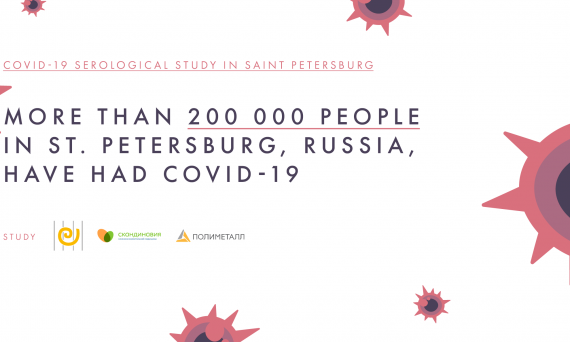Researchers from European University at St. Petersburg and Scandinavia clinic are conducting the first representative Sars-Cov-2 serological survey in Russia. Preliminary results show that 5,7% of St. Petersburg residents have had Covid-19.
Saint Petersburg — 19 June 2020. Population-based serosurveys is the most reliable way to understand population exposure to SARS-CoV-2 — the virus leading to disease responsible for COVID-19 pandemic. Such tests detect proteins that our bodies generate in response to the virus. This May epidemiologists, economists, and sociologists from the European university at St. Petersburg and Scandinavia clinic with support from JSC Polymetal launched a population survey that tests representative sample of city St. Petersburg population for antibodies to the virus.
Preliminary results adjusted for sampling bias and test characteristics suggest that 5,7% of city residents aged 18 and older have antibodies to SARS-CoV-2 (95% confidence interval: 3,5%...7,8%, over 490 people tested out of expected 1000).
Observed prevalence is similar to other cities in the world (Geneva up to 10,9%, Stockholm — 7,3%, Los Angeles — 4,7%). Like elsewhere, the actual number of people who have had COVID-19 is much higher than the number of confirmed cases. However the majority of city residents do not have antibodies. This might indicate higher risks of the second wave of the pandemic since the majority of people have not contracted the virus.
Researchers are surveying city population by randomly inviting people to participate in the study over phone (random digit dial). The clinic is collecting blood samples of the after informed consent was obtained from the participants. Importantly, researchers have recorded the characteristics of both the volunteers and those who have refused to participate. This allowed to adjust the prevalence estimates for non-participation bias.
The surveyed population is observed to differ in its willingness to participate. Those who have travelled abroad, have visited public spaces, or are younger are more likely to participate. Ignoring this sampling bias might have lead to a naïve estimate of 8% testing positive. Study design eliminated this sizeable upward bias of prevalence. This is the Russia’s first representative serological survey that joins the limited set of international studies that account for both sampling bias and test characteristics. Test results are obtained from Abbott Architect SARS-CoV-2 IgG immunoassay system operated by Invitro laboratory.
Vadim Volkov, rector, European University at St. Petersburg: “This is a case where a private company, a university and a clinic have joined their efforts to produce a public good. Our primary goal is to use our methodological expertise to reduce any errors in prevalence estimates. Preliminary data show that there is a significant difference between the naïve and adjusted estimates.”
Preliminary evidence also indicates that every study week from 18 May, 2020 to 7 June, 2020 the prevalence was steadily increasing. Future research will give valuable information on infection spread dynamics and immune response. Anton Barchuk, epidemiologist, study co-author: “It is of paramount importance to continue the study by increasing the number of participants and conducting repeated testing. In addition to understanding prevalence we need to assess the immunity dynamics. So far we do not know exactly whether positive antibody test results suggest protective immunity or how long antibodies are present in blood.”
Researchers have used tests from various producers in parallel. Results obtained from rapid tests were problematic to interpret. High observed false positive and false negative rate of such tests led researchers to conclude that rapid tests should be used in serosurveys with caution.
Daniil Shirokov, researcher, Scandinavia clinic: “This research is important for us to understand which tests are acceptable in our practice. We are cognizant that no ideal test exists but among other study objectives we would like to assess characteristics of tests that are currently available in Russia.”
Researchers are continuing their work on collected samples in cooperation with Russian producers of test systems such as Genetico.
Study authors will be glad to address any questions relating to the study or offer detailed comments.
Contact: Alla Samoletova, tel.: +7 906 258 78 77, e-mail: asamoletova@eu.spb.ru.
Additional information:
Presentation with preliminary results (in Russian) — download in pdf.
